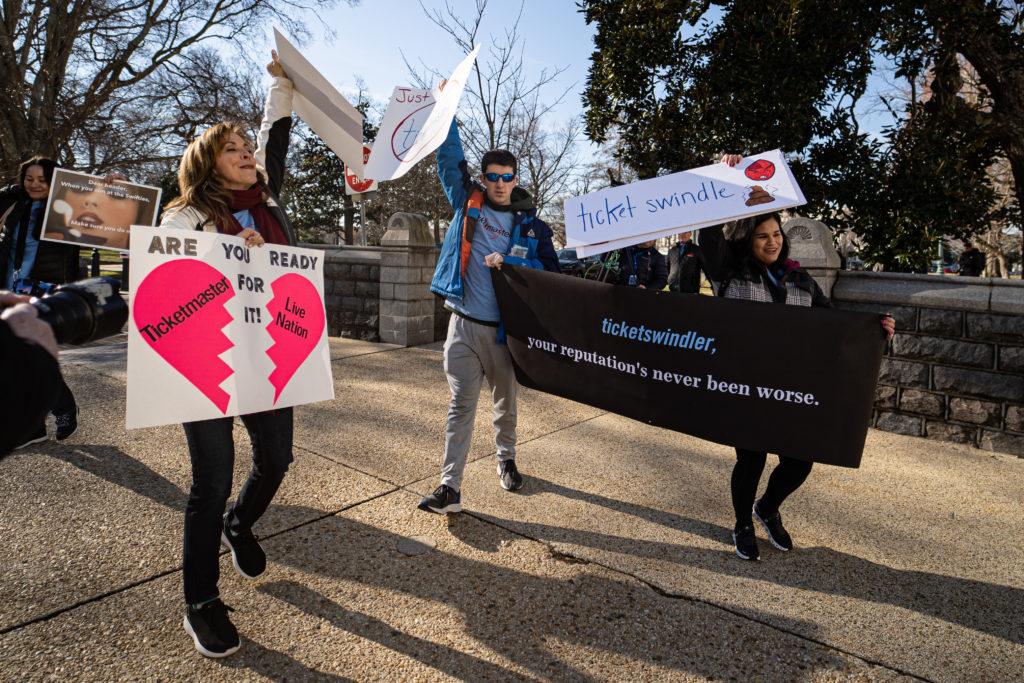Protestors rallied outside of the U.S. Capitol building Tuesday, calling on lawmakers to break up ticketing company Live Nation Entertainment during a Senate Judiciary Committee hearing focused on the lack of competition within the live event ticketing industry.
About nine Taylor Swift fans mobilized in front of the Capitol Tuesday, urging Live Nation Entertainment, the product of Ticketmaster and Live Nation’s 2010 merger, to break up after being unable to purchase presale tickets for the pop star’s upcoming tour in November. But during the protest outside Congress, inside the building, members of the Senate Judiciary Subcommittee on Competition Policy, Antitrust and Consumer Rights met with live event ticketing authorities and entertainment industry professionals, expressing their concern about the company’s potential monopoly over the industry.
Jennifer Kinder – an attorney from Kinder Law, which is representing more than 300 plaintiffs filing lawsuits against Ticketmaster because of their experience during Swift’s ticket presale – attended the protest, sporting a T-shirt with the ticket vendor’s logo crossed out. She said she helped organize the event and hopes the Senate can take some “real strong measures” to “punish” and break up Ticketmaster-Live Nation.
“What they can do is they can really control the monopoly, they can change it, they can deconstruct it, they can break the whole thing up, that’s what Congress can do,” Kinder said.
The Ticketmaster site crashed in November during the presale for Swift’s stadium tour, “Eras,” and many fans who queued online to purchase a seat waited for hours before running out of luck, with thousands of fans unable to purchase tickets to the tour.
Penny Harrison, one of the lawsuit’s plaintiffs, held a sign reading, “Ticketswindler, your reputation’s never been worse.” She said she joined Kinder at the protest because of her experience at Swift’s presale and her belief that there is no industry “competition” after the merger.
She said ticket sales after the 2010 merger agreement have exponentially increased ticket prices. She added that she wants to see antitrust campaigns that spark more industry competition and more affordable ticket prices for the public.
“I hope that the Senate will understand that there was a mistake that was made back in 2010, when the DOJ allowed them to actually merge and create one large company,” Harrison said.
The Justice Department approved the merger of Ticketmaster and Live Nation in 2010 under a requirement that Ticketmaster gives Anschutz Entertainment Group access to its ticketing software so that the group could compete with Ticketmaster and prohibit LNE from retaliating against venues that abandon it for a competing ticketing service.
Since the merger, Live Nation Entertainment has continued to acquire complete ownership and majority stakes in numerous entertainment companies, further consolidating the live event industry and increasing its market share within the industry.
Jenn Landry, a protester from Houston, TX, said her experience with obtaining tickets was a “horror story” because of the high prices and long wait times. She said the plaintiffs are suing for “answers.”
“I’m really sorry that this happened to you, and you have a voice, too,” Landry said.
The Senate Judiciary Subcommittee on Competition, Antitrust and Consumer Rights led the hearing. Sens. Amy Klobuchar, D-MN, and Mike Lee, R-UT, called upon witnesses in the live event ticketing industry, including President and Chief Financial Officer of Live Nation Entertainment Joe Berchtold, SeatGeek Chief Executive Officer Jack Groetzinger and JAM Productions CEO Jerry Mickelson.
Berchtold said at the Senate hearing that fans and bots trying to buy tickets and resell them on secondary websites overran the Ticketmaster website during the Swift concert sale.
“We knew bots would attack that on-sale and planned accordingly,” Berchtold said. “We were then hit with three times the amount of bot traffic than we had ever experienced.”
Mickelson said fans should be voicing their concern about the extreme prices resulting from the Ticketmaster-Live Nation monopoly.
“The fan is getting, let’s just say, screwed,” Mickelson said. “They can’t afford to go to the shows that are taking place because of the greed that Ticketmaster wants to pay for their bottom line.”
Senators also called upon Clyde Lawrence, a singer and songwriter for the soul-pop band Lawrence, Kathleen Bradish, vice president for legal advocacy at the American Antitrust Institute and Sal Nuzzo, senior vice president of The James Madison Institute, an economic policy think tank on issues affecting Floridians.
Lawrence, who testified on behalf of his self-titled band, said fans would be “surprised” to find out how much the artists receive from ticket sales, citing how artists don’t receive any part of the service fees Ticketmaster adds during sales. He said it is ultimately up to Congress to “reckon” with the Ticketmaster-Live Nation merger.
“If the way the pie is being divided up isn’t fair for the artist, you’re gonna have more and more artists not able to break even on tour,” Lawrence said.
Nuzzo said he hopes the hearing shows the “complex nature” of the practices of companies like Live Nation Entertainment and how they impact consumers, as well as presenting a timeline of the monopoly and its effects.
“One player has such a dominant position that they’re able to kind of exert their will on just about everything in the industry and, in a way, integrate that,” he said. “Ultimately, as you could, as you probably heard, it harms the bands, harms the venues and harms consumers.”
Sen. Richard Blumenthal, D-CT, said the statement Ticketmaster put out in response to the presale website crash – that Swift would have to perform “a stadium show every single night for the next 2.5 years” to meet the high demand for the Era’s Tour – implied the “debacle” was Swift’s fault.
“Ticketmaster ought to look in the mirror and say ‘I’m the problem. It’s me,’” Blumenthal said.







